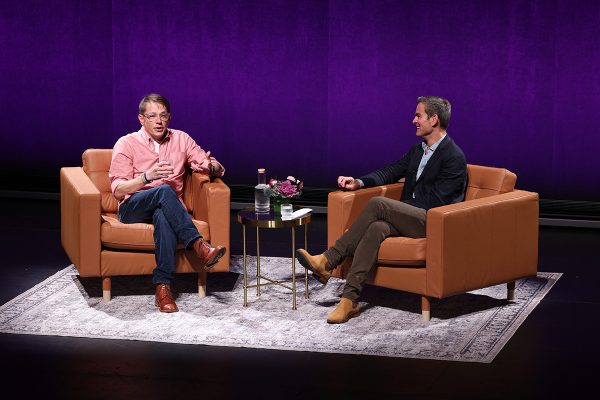On Thursday evening, screenwriter, producer, and class of ‘98 alumnus Seth Grahame-Smith returned to Emerson to deliver his raw and honest truth about life post-graduation and working in the film industry to a packed crowd in Paramount Center on the Robert J. Orchard Stage.
The event, entitled ‚ÄúWhat Emerson Built You For,‚Äù was co-hosted with Jared Bowen, a fellow alumnus from the class of ‚Äò98, spanning topics from Emerson‚Äôs unique social scene to stories of struggling to make it in the Hollywood studio system.¬Ý
The title of the talk comes from the late Pete Chvany, a previous Emerson soccer coach and mentor whom Grahame-Smith paid homage to throughout the master class. Grahame-Smith explained how, a few weeks before graduation, he had admitted to Chvany that he was really scared to go out into the world. In response, Chvany put a hand on Grahame-Smith’s shoulder and said, “That’s what we built you for.”
Grahame-Smith is a New York Times bestselling author, best known for his books, later adapted to films, ‚ÄúPride and Prejudice and Zombies‚Äù and ‚ÄúAbraham Lincoln: Vampire Hunter.‚Äù Additionally, he was a screenwriter on “The Lego Batman Movie” and produced Stephen King’s “It”¬Ý(2017) ‚Äîeach of which have grossed hundreds of millions of dollars worldwide. Bowen, a journalism undergraduate in his time at Emerson, is now an Emmy Award-winning Executive Arts Editor as well as the host of WGBH’s “The Culture Show.”¬Ý
During the talk, the pair reminisced on their time as students at Emerson and shared tales of haunted dorms, dilapidated Dunkin’ Donuts, and memorable mentors.
The event is the first in the new Master Classes series, an initiative under the college‚Äôs strategic plan. The goal is to feature paneled discussions hosted by alumni with relevant industry experience, which will occur throughout the year on the college’s Boston and Los Angeles campuses.
President Jay Bernhardt expressed hope in an opening address before the talk that these events will ‚Äúcreate a meaningful expert engagement among our alumni parents, friends, and others, with the student body, strengthening, learning, and creating connections across our community.‚Äù¬Ý
A major theme of the night was how important the relationships formed at Emerson are, which Grahame-Smith said are so ‚Äúspecial‚Äù because of how ‚Äúunique‚Äù the students are. The ode to Emersonians remained fitting for a crowd that was filled with alumni who came to Boston for Emerson’s alumni weekend.¬Ý
‚ÄúEmerson still attracts a certain type of student‚Äîa very unique type of student because we’re a very unique school,‚Äù said Grahame-Smith. ‚ÄúWe‚Äôre not for everybody. We’re for people who don’t wait for permission to make their art or use their voices.‚Äù¬Ý
For Emerson students gathered at the talk, the panelists argued that there is no singular path to success in the arts.¬Ý

‚ÄúYou begin to open the path up for yourself, and you make it happen for yourself,‚Äù said Bowen, who began in print journalism and transitioned into broadcast media.¬Ý
Grahame-Smith recalled how, after Emerson, he contacted Emerson class of ‚Äò70 alumnus Gary Grossman, co-owner of Weller/Grossman Productions. Grossman gave him a production assistant job where he worked on documentaries for the History and Discovery Channels. Grahame-Smith wrote, did field cases, traveled the country shooting interviews, and directed recreations. Unfortunately, his passion didn‚Äôt reside in these types of projects, and his gut was telling him it wasn‚Äôt right.¬Ý
‚ÄúI was absolutely miserable,‚Äù said Grahame-Smith. ‚ÄúI felt like a failure. Because that’s not what Steven Spielberg did, right? I’m supposed to be out here being Steven Spielberg.‚Äù¬Ý
Grahame-Smith expressed feeling very lucky that he had the opportunity in retrospect, but in the moment, he knew it wasn‚Äôt his destiny. So, he began writing books. His novel ‚ÄúPride, Prejudice, and Zombies‚Äù came out in 2009 and ‚Äúchanged his life forever.‚Äù Grahame-Smith made a point to clarify that this life-altering event didn‚Äôt occur until he was 32 years old, 10 years after graduation. He reminded attendees that it‚Äôs okay not to have everything figured out in your twenties.¬Ý
“I had spent 10 years trying and failing,” said Grahame-Smith. “You can’t see the path when you’re on the path. There’s no one path for anybody. There’s no timeline.”
Throughout the discussion, Grahame-Smith and Bowen reassured students that the path after Emerson is not linear, but they‚Äôre living proof that it all works out in the end.¬Ý
Senior School of Film student Kit Zenga, voiced her concerns about life after graduation during a Q&A session following the talk.
‚ÄúYou mentioned after Emerson, you were crashing on someone’s couch‚Ķ I graduate in the spring, and I‚Äôm so worried about what happens after Emerson,‚Äù said Zenga.¬Ý
‚ÄúI know you‚Äôre worried now,‚Äù said Grahame-Smith. ‚ÄúI‚Äôm here from the future; it all works out.‚Äù¬Ý
For Zenga, Grahame-Smith’s insights helped her feel better about her career trajectory.
‚ÄúIt made me feel like if I still don‚Äôt know what I want to do in nine years, that it‚Äôs okay and I can still make it,‚Äù she said¬Ý
Other attendees, like sophomore School of Film student Takara Bayley-Gale, found the talk “very impactful and entertaining,” with many echoing feelings of hope and newfound perspective as they left.
Juliette Hagobian, a junior creative writing major, echoed this. ‚ÄúThis talk was such a wonderful insight into our alumni and their experiences,‚Äù she said. ‚ÄúIt felt inspiring to hear someone from ‚Äòthe future‚Äô talk about their life post-Emerson. I feel really motivated.‚Äù¬Ý